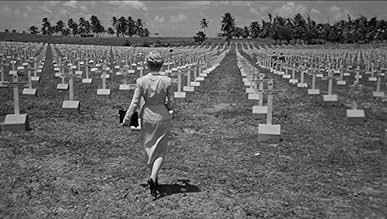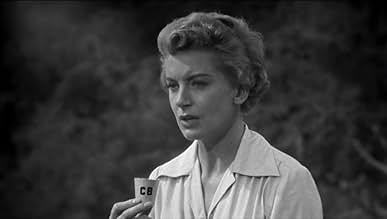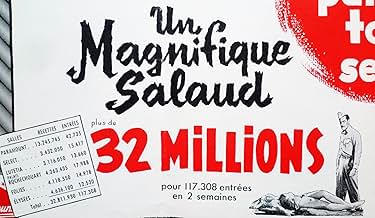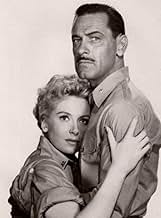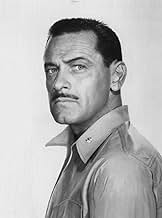अपनी भाषा में प्लॉट जोड़ेंIn the Pacific during WWII, a Roman Catholic widow falls for a tough lieutenant colonel.In the Pacific during WWII, a Roman Catholic widow falls for a tough lieutenant colonel.In the Pacific during WWII, a Roman Catholic widow falls for a tough lieutenant colonel.
- निर्देशक
- लेखक
- स्टार
- 2 ऑस्कर के लिए नामांकित
- 2 कुल नामांकन
Claude Akins
- Big Soldier
- (बिना क्रेडिट के)
Nina Borget
- French Woman
- (बिना क्रेडिट के)
George Brenlin
- Casualty
- (बिना क्रेडिट के)
Lorayne Brox
- Sissie
- (बिना क्रेडिट के)
Evelyn Cotton
- Beth
- (बिना क्रेडिट के)
Maynard Ferguson
- Trumpet Player in Dance Scene
- (बिना क्रेडिट के)
फ़ीचर्ड समीक्षाएं
Considering the cast this oddly obscure WWII war drama is nothing special but is ultimately an entertaining drama.
The basic story is a standard one of a clash of values between two people with very different life experiences.
The best performance as usual comes from Thelma Ritter as a no nonsense nurse, whenever she's on screen she cuts right through the somewhat sugary dramatics with astringent fortitude.
Deborah Kerr and William Holden perform their assigned roles well but their characters are both pretty selfish and unsympathetic to involve you in their story.
The basic story is a standard one of a clash of values between two people with very different life experiences.
The best performance as usual comes from Thelma Ritter as a no nonsense nurse, whenever she's on screen she cuts right through the somewhat sugary dramatics with astringent fortitude.
Deborah Kerr and William Holden perform their assigned roles well but their characters are both pretty selfish and unsympathetic to involve you in their story.
Several scenes from "The Proud and the Profane" were shot at my parents' home in St Thomas, USVI, at Estate Frenchman's Bay on the island's southern side. The company bought (and left) an additional refrigerator to make & keep ice for the stars' drinks (it gets hot under the lights in the Caribbean!). I also remember seeing a few huge electric bulbs that apparently were blown out or not worth the expense of shipping back to Hollywood. Since I was in elementary school in the States at the time of shooting, I didn't get to watch any of the production, but heard all the stories when I returned for the summer. "The Frogmen", with Richard Widmark, was also shot on the property (in the bay in front of the house).
An intriguing recounting of the tolls of war from a human standpoint without graphic depiction of battle scenes, this focuses upon the lives of four primary characters stationed in Guadalcanal and/or Bataan, in the South Pacific, during World War II.
"The Proud and Profane" (Paramount, 1956) studies psychological aspects of its characters: Lieutenant Colonal Colin Black (William Holden in a belligerent role), Lee Ashley (Deborah Kerr as a determined force), Kate Connors (Thelma Ritter as a no-nonsense nursing supervisor), Eddie Wodcik (Dewey Martin as an innocent serviceman) and Chaplain Holmes (William Redfield as an altruistic minister).
While Lee volunteers with Kate's Red Cross troop with an ulterior motive in mind, Colin finds himself drawn to her unattainable reserve. Kate provides common sense for Lee to abide by and also security for the nurses and wounded service personal in her charge, as well as for Eddie, whom she treats as her nephew.
Produced by William Perlberg, directed by George Seaton, with its screenplay by George Seaton, based on a novel by Lucy Herndon Crockett, this wartime drama pleasantly buffers the viewer from unwelcome scenes of direct enemy attacks. Filmed in Black & White on location in Puerto Rico, this affords the viewer arrays of tropical scenery and often contains aerial footage of panoramic mountain scenery, as well as its calm coastal plains and lagoons.
Its capable cast handles its material well, with poignant portrayals of those who serve and suffer...in more ways than one.
"The Proud and Profane" (Paramount, 1956) studies psychological aspects of its characters: Lieutenant Colonal Colin Black (William Holden in a belligerent role), Lee Ashley (Deborah Kerr as a determined force), Kate Connors (Thelma Ritter as a no-nonsense nursing supervisor), Eddie Wodcik (Dewey Martin as an innocent serviceman) and Chaplain Holmes (William Redfield as an altruistic minister).
While Lee volunteers with Kate's Red Cross troop with an ulterior motive in mind, Colin finds himself drawn to her unattainable reserve. Kate provides common sense for Lee to abide by and also security for the nurses and wounded service personal in her charge, as well as for Eddie, whom she treats as her nephew.
Produced by William Perlberg, directed by George Seaton, with its screenplay by George Seaton, based on a novel by Lucy Herndon Crockett, this wartime drama pleasantly buffers the viewer from unwelcome scenes of direct enemy attacks. Filmed in Black & White on location in Puerto Rico, this affords the viewer arrays of tropical scenery and often contains aerial footage of panoramic mountain scenery, as well as its calm coastal plains and lagoons.
Its capable cast handles its material well, with poignant portrayals of those who serve and suffer...in more ways than one.
It was strange, but interesting watching this movie. Deborah Kerr plays an American Red Cross volunteer who pulls strings to get assigned to the South Pacific to find out the circumstances of her husband's death on Guadalcanal. Thelma Ritter (excellent as always) plays her supervisor who becomes close to Kerr and is not liking what is going on. William Holden (who is unrecognizable, except for the voice) plays sadistic Colonel Black, who is attracted in to the upper middle class Deborah Kerr. It is an unusual role for Holden since his roles typically are suave, sophisticated and the handsome leading man type of parts. Compared to movies from current adolescent-minded writers, directors and producers, it is palatable.
The Proud and Profane (1956)
Yes, this movie features William Holden and Deborah Kerr, who do their characteristic best in a lower budget echo of the 1953 blockbuster "From Here to Eternity," also featuring Kerr (but with Lancaster and, for good measure, Montgomery Clift). The comparison is fair, because the similarities are too blatant, and so it's fair to also say that, as ordinary as this movie is, it had potential. There are qualities to the story line that are too moving (wounded soldiers in the Pacific, a widow tracing the last days of her Marine husband's life, a love affair against the rules) and the actors are too fine (add Thelma Ritter as an important third) to just dismiss the whole thing as a mess.
The director, George Seaton, is really a screenwriter, and though he directed a dozen features, none of them are especially memorable. His real fame rests on assisting with several great movies (like "The Wizard of Oz") and with a single brilliant coup--the screenplay for the original 1947 as well as the later TV version of "Miracle on 34th St." And it is no surprise that Seaton's own screen writing in "The Proud and Profane," though prosaic, is very good.
Ah, but filmmaking is about timing, flow, surprise, drama, light, shadow, and sounds of all kinds. This is the director's blank canvas and Seaton doesn't go anywhere in any of these areas. The light is bright and flat. The camera-work is functional and bland (cameraman John Warren being a newcomer, moving quickly to television, including many Hitchcock episodes). The score is strong (thanks to veteran master Victor Young) but there is no attempt to insert diegetic music or more interesting internal sounds. Even the supporting cast is pigeonholed into clichés (and there is no critical secondary male role, as Clift played in the 1953 movie). Thelma Ritter is at her best, more normalized than in other roles, but believable and superb.
I write all this for a routine movie because of Holden, who is an understated and sometimes brilliant actor, and Kerr, who I never warm up to but who is almost designed to be too cold to like. Kerr in particular is up and down here, at times so perfectly cast and so convincing you start to really watch closely, but other times she has to stretch her role a little (when she is dancing, for example, or in the cheesy beach scene early on) and it's awkward. Holden is made to be an enigma, and when he warms up (out of uniform) he's likable, and when he's cold, he's cold, but never admirable, which is what a commander needs to be at least.
I enjoyed this movie because I enjoy movies, but also because it has aspects that are terrific. If you really like war films that aren't about battle (as I do), this is a must see. And if you want perspective on "From Here to Eternity" you really will appreciate both films more. For just a fresh, well-made movie, terrific you will need to keep looking.
Yes, this movie features William Holden and Deborah Kerr, who do their characteristic best in a lower budget echo of the 1953 blockbuster "From Here to Eternity," also featuring Kerr (but with Lancaster and, for good measure, Montgomery Clift). The comparison is fair, because the similarities are too blatant, and so it's fair to also say that, as ordinary as this movie is, it had potential. There are qualities to the story line that are too moving (wounded soldiers in the Pacific, a widow tracing the last days of her Marine husband's life, a love affair against the rules) and the actors are too fine (add Thelma Ritter as an important third) to just dismiss the whole thing as a mess.
The director, George Seaton, is really a screenwriter, and though he directed a dozen features, none of them are especially memorable. His real fame rests on assisting with several great movies (like "The Wizard of Oz") and with a single brilliant coup--the screenplay for the original 1947 as well as the later TV version of "Miracle on 34th St." And it is no surprise that Seaton's own screen writing in "The Proud and Profane," though prosaic, is very good.
Ah, but filmmaking is about timing, flow, surprise, drama, light, shadow, and sounds of all kinds. This is the director's blank canvas and Seaton doesn't go anywhere in any of these areas. The light is bright and flat. The camera-work is functional and bland (cameraman John Warren being a newcomer, moving quickly to television, including many Hitchcock episodes). The score is strong (thanks to veteran master Victor Young) but there is no attempt to insert diegetic music or more interesting internal sounds. Even the supporting cast is pigeonholed into clichés (and there is no critical secondary male role, as Clift played in the 1953 movie). Thelma Ritter is at her best, more normalized than in other roles, but believable and superb.
I write all this for a routine movie because of Holden, who is an understated and sometimes brilliant actor, and Kerr, who I never warm up to but who is almost designed to be too cold to like. Kerr in particular is up and down here, at times so perfectly cast and so convincing you start to really watch closely, but other times she has to stretch her role a little (when she is dancing, for example, or in the cheesy beach scene early on) and it's awkward. Holden is made to be an enigma, and when he warms up (out of uniform) he's likable, and when he's cold, he's cold, but never admirable, which is what a commander needs to be at least.
I enjoyed this movie because I enjoy movies, but also because it has aspects that are terrific. If you really like war films that aren't about battle (as I do), this is a must see. And if you want perspective on "From Here to Eternity" you really will appreciate both films more. For just a fresh, well-made movie, terrific you will need to keep looking.
क्या आपको पता है
- ट्रिवियाFeature-film debut of Frank Gorshin playing the uncredited role of "Harry." In the film's opening at dockside, just after Lee arrives, Kate stops to talk to Harry about obtaining a can of paint off his truck.
- गूफ़The US Army Air Force C-47 cargo planes are painted in post WWII paint scheme rather than the wartime green. When the Air Force became a separate service in 1947 the white over bare metal paint scheme as seen in the movie was adopted.
- भाव
Chaplain Lt. (jg) Holmes: It must be wonderful to feel that one has lived such a perfect life... that forgiveness has never been necessary.
टॉप पसंद
रेटिंग देने के लिए साइन-इन करें और वैयक्तिकृत सुझावों के लिए वॉचलिस्ट करें
- How long is The Proud and Profane?Alexa द्वारा संचालित
विवरण
बॉक्स ऑफ़िस
- US और कनाडा में सकल
- $39,00,000
- चलने की अवधि1 घंटा 51 मिनट
- रंग
- पक्ष अनुपात
- 1.85 : 1
इस पेज में योगदान दें
किसी बदलाव का सुझाव दें या अनुपलब्ध कॉन्टेंट जोड़ें


